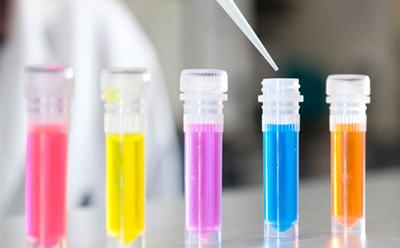Oligo synthesis aids development of faster COVID-19 tests

Chemical synthesis experts are focussing on key components for faster, simpler and more portable COVID-19 diagnostic kits at a company founded by a Visiting Professor at the University of Southampton.
ATDBio is providing academic and industrial groups with modified oligonucleotides for use in the development of new diagnostic testing procedures.
The business, which is located in Southampton’s School of Chemistry and the Oxford Science Park, was founded at Southampton in 2005 by Professor Tom Brown.
In recent weeks, dedicated scientists in ATDBio and Tom’s research group have been working tirelessly on COVID-19 applications, collaborating with partners and clients in industry and academia, including the Oxford and Southampton NHS Trusts, Medical Research Council and the Defence Science and Technology Laboratory (Dstl).
“Gaining control of the pandemic will depend upon rigorous population surveillance on a worldwide scale,” Tom says. “Rapid identification of new cases followed by isolation and testing of their recent contacts is by far our most powerful short-term weapon. The value of widespread testing has been demonstrated in Germany and South Korea and it will be vital as lockdown is relaxed. It will have to continue far into the future, at least until a vaccine has been rolled out across the globe.
“The current method of choice for detection of an active infection is reverse-transcriptase-PCR amplification (RT-PCR) of the viral RNA combined with a fluorescent signalling technology known as Taqman. It has proved difficult to roll out these tests in the UK in sufficient volume due to limited availability of reagents, instrumentation and expertise, and it is likely that similar problems will be encountered in many other countries across the globe.”
Oligonucleotides are short pieces of DNA and RNA that are used in therapeutic applications, molecular biology, nanotechnology and basic research.
“There is also a need for tests which are inexpensive and can be transported to any part of the world, no matter how remote, including regions where technological resources are limited,” Tom says. “We are only as strong as our weakest link in fighting the COVID-19 pandemic and ATDBio is providing groups with modified oligonucleotides so that they can develop these faster, simpler and more portable test systems.
“I would like to thank the University of Southampton for their fantastic support during this crisis, in particular the senior management in Chemistry; Gill Reid, Richard Brown and Bruno Linclau who helped us to keep the lab functioning efficiently.”
Tom moved to Southampton in 1995 as a Professor of Nucleic Acid Chemistry and he is now a Visiting Professor of Chemical Biology. As a result of his contributions to nucleic acid-based diagnostics, he was named Chemistry World Entrepreneur of the Year in 2014 and Biotechnology and Biological Sciences Research Council (BBSRC) Innovator of the Year in 2016.
In 2005, he founded ATDBio and co-founded PrimerDesign, a company that manufactures diagnostic kits. PrimerDesign has since become part of the Novacyt group and is currently supplying COVID-19 diagnostic kits around the globe.